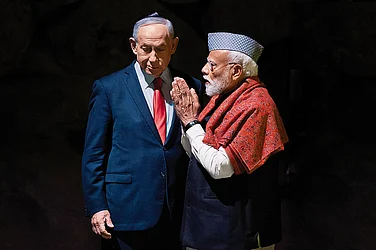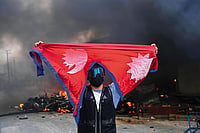As the Israel-Hamas war, that has so far claimed over 10,000 lives, entered its second month on Tuesday, the Israeli military's ground forces have now advanced into “the depths” of Gaza City where civilians already had limited access to food, water and fuel for the last one month. The month-old war has upended lives on either side of the conflict, with no end in sight as Israel vowed to crush Hamas and its military capabalities amid global calls for a humanitarian pause.
The Health Ministry in Hamas-ruled Gaza says the Palestinian death toll from the ongoing war with Israel has jumped over 10,000 – the vast majority of whom are believed to have been killed by Israeli airstrikes. Some 1,400 Israelis have been killed, mostly civilians, in the October 7 attack by Hamas.
Cut off from the rest of the world due to patchy mobile and internet networks, over half a million people in Gaza are facing the looming threat of death by starvation after Israel sealed the strip’s borders from access to food, medicine, fuel and water. Although over 450 trucks carrying aid have been allowed to enter Gaza from Egypt since October 21, humanitarian workers say the aid that has come through the Rafah crossing is insufficient to meet mounting needs in the territory, which is home to some 2.3 million Palestinians.
Gruesome stories, images, videos, and voices pleading for help emerged from the war-torn region over the last month. Even as Israeli bombardments continued, some 2,000 people, many carrying what was left of their basic resources in their arms, some holding the bodies of their loved ones, walked down Gaza's main north-south highway on Sunday. “The children saw tanks for the first time. Oh world, have mercy on us,” one Palestinian man told AP.
Journalists who reported the grave humanitarian crisis in Gaza from the ground, woke up to news of their family members being killed by Israeli airstrikes. Desperate Palestinians searched for bodies of their families under the rubble of what was once their home. Hospitals, ambulances, and schools in Gaza are being attacked, drawing widespread condemnation from the world, as it is a grave violation of the Geneva Conventions, and is a war crime.
The hospitals are not just sheltering the wounded, but also those who fear their death, and feel some comfort in these spaces that have for long offered help in the strife-torn region. But when the Palestinian Health Ministry in Gaza held a press conference amid a pile of dead bodies after an attack on the Al-Ahli Arab hospital killed at least 500 innocent civilians, Gazans wondered if there was a way to flee death after all.
Despite mounting casualties, Israel has rejected US suggestions for a pause in fighting to facilitate humanitarian aid deliveries and the release of some of the estimated 240 hostages seized by Hamas in its raid. Israel has also dismissed calls for a broader cease-fire from concerned Arab countries — including Jordan and Egypt, which made peace with it decades ago.
On Tuesday, Israeli Prime Minister Benjamin Netanyahu said Israel will have “overall security responsibility” in Gaza for an indefinite period after its war with Hamas, in what is being seen as the clearest indication yet that Israel plans to maintain control over the coastal enclave that is home to some 2.3 million Palestinians.
Amid hopes and calls for dawn of peace, Outlook looks at the different paths to peace in Gaza and the possible governance of the strife-torn region once the war is over. .





















